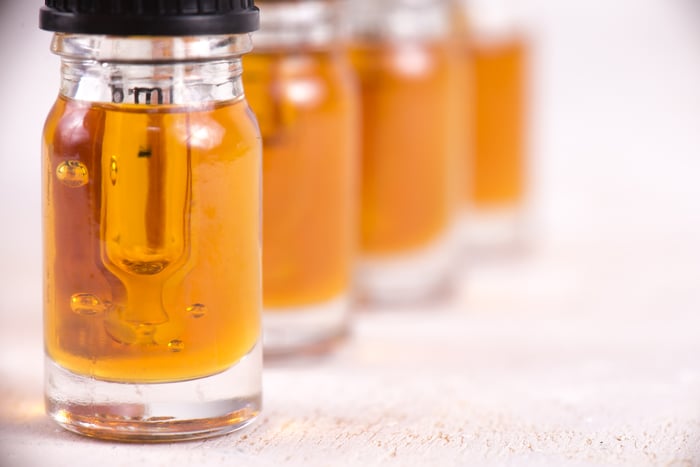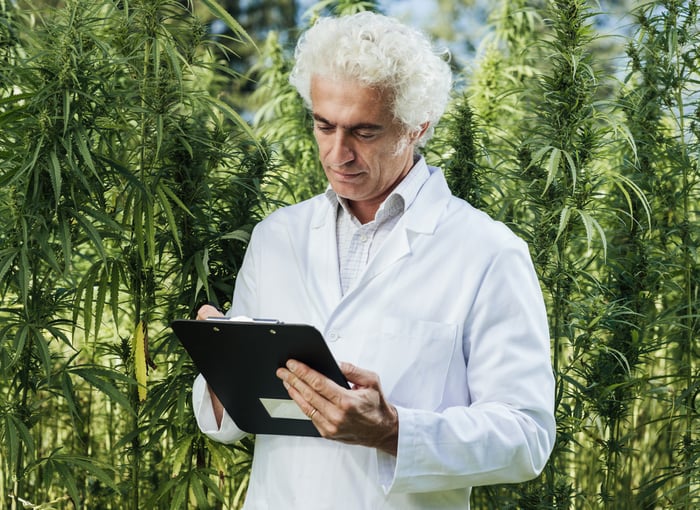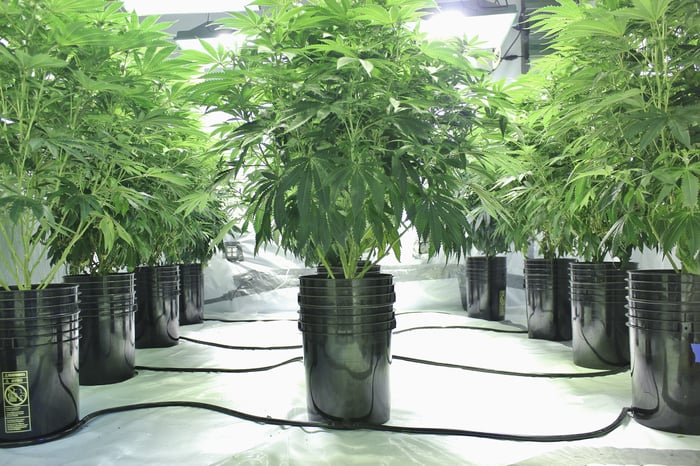RMHB -
Forget THC! Cannabidiol (CBD) Is the Marijuana Industry's Moneymaker The CBD market could offer a compound annual growth rate of 147% through 2022.
Sean Williams
( TMFUltraLong)
Nov 24, 2018 at 9:06AM
Ready or not, legal marijuana is taking North America by storm. Even though the U.S. federal government has held firm on marijuana as a Schedule I drug (i.e., entirely illegal, prone to abuse, and not recognized as having any medical benefits), we've nevertheless witnessed 32 states legalize medical weed in some capacity. To our south, Mexico legalized medical pot in the summer of 2017 and is now strongly considering legalizing adult-use weed. And to our north, on Oct. 17, Canada became the first industrialized country in the world to give the green light to recreational cannabis.
According to investment firm Cowen Group, which has been one of the most optimistic Wall Street firms on the outlook for global cannabis, the industry could hit $75 billion in annual sales by 2030. This pie-in-the-sky sales figure is a big reason behind the lofty valuations of most marijuana stocks.
 Image source: Getty Images. Image source: Getty Images.
But what investors may not realize is that not all cannabis is created equally. Just as no two marijuana stocks are the same, neither are the prospects for different cannabis products. Whereas the world is eyeing sales of dried cannabis flower that's rich with tetrahydrocannabinol (THC), the cannabinoid responsible for getting a user "high," I believe it's the other important cannabinoid known as cannabidiol (CBD) that'll ultimately be the big moneymaker for pot stocks.
CBD is where the big money is Cannabidiol, like THC, comes from the cannabis plant (although CBD can also be found in abundance via hemp). However, CBD doesn't get a user high. Rather, it's best known for its perceived medical benefits.
For example, GW Pharmaceuticals ( NASDAQ:GWPH) earlier this year became the first drug developer to have the U.S. Food and Drug Administration approve a cannabis-derived therapy. Epidiolex, as it's known, is an oral CBD-based medicine that's designed to treat two rare forms of childhood-onset epilepsy. In clinical trials, GW Pharmaceuticals' lead drug wound up significantly reducing seizure frequency from baseline relative to a placebo. Eventual sales of GW Pharmaceuticals' top drug may top $500 million annually, but that will, of course, depend on insurer coverage and the willingness of physicians to prescribe Epidiolex.
The thing is, CBD isn't just limited to cannabinoid-based drugmakers. Marijuana growers can incorporate CBD into oils, capsules, pills, vapes, infused beverages, edibles, and pretty much any alternative form of consumption you can think of. It's worth noting, though, that with the exception of oils, alternative forms of consumption are currently illegal in Canada. However, Parliament is widely expected to discuss and approve new consumption options by next summer.
 Image source: Getty Images. Image source: Getty Images.
According to the Brightfield Group, a cannabis analytics firm, the CBD market is on track to generate $591 million in sales in 2018. However, by 2022, hemp-CBD sales are projected to reach... drumroll... $22 billion. For you math-phobes out there, this represents a compound annual growth rate of 147% over the next four years.
What's more, CBD-rich products tend to be a considerably higher-margin item than traditional dried cannabis flower. Though focused on a smaller group of consumers than dried flower, CBD products have little in the way of pricing pressures or oversupply concerns.
These pot stocks are focusing on CBD products In other words, marijuana stocks that incorporate CBD products into their portfolios have a much better opportunity to improve their operating margins over the long run, as well as avoid any pricing pressures caused by an oversupply of dried flower.
Not surprisingly, one such company that's made a concerted effort to develop alternative products is Aurora Cannabis ( NYSE:ACB), the projected top dog in peak production. Once its acquisition of ICC Labs is complete, Aurora Cannabis could be on track for 700,000 kilograms of peak annual output. However, Aurora's acquisition of Saskatchewan-based CanniMed Therapeutics brings into the fold an oils processing facility with a design capacity of 720,000 liters of annual oil production. It's also partnered with Capcium -- and allowed Capcium to set up shop at its Aurora Vie facility -- to produce softgel capsules. These softgels could be pivotal in pushing Aurora's margins higher in the years that lie ahead.
 |





 Image source: Getty Images.
Image source: Getty Images. Image source: Getty Images.
Image source: Getty Images.